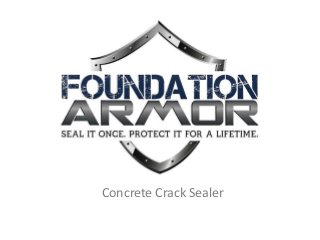Concrete crack sealer
•Download as PPTX, PDF•
0 likes•246 views
Concrete sealers should never be used to repair cracks, unless the crack is considered to be a “spider crack” (a very, very small surface crack that isn’t letting in water). If you have a crack that isn’t considered hairline, you want to use the appropriate type of DIY concrete repair kit. Kits are manufactured for small cracks, large cracks, dry cracks, leaking cracks, wall cracks and floor cracks.
Report
Share
Report
Share

Recommended
Recommended
More Related Content
More from Foundation Armor
More from Foundation Armor (6)
Concrete crack sealer
- 2. Concrete sealers should never be used to repair cracks, unless the crack is considered to be a “spider crack” (a very, very small surface crack that isn’t letting in water). If you have a crack that isn’t considered hairline, you want to use the appropriate type of DIY concrete repair kit. Kits are manufactured for small cracks, large cracks, dry cracks, leaking cracks, wall cracks and floor cracks.
- 3. There are several companies that manufacture a “crack sealer.” There are also several companies that brand hydraulic cement as a crack sealer. The only problem with most solutions on the market and with hydraulic cement, is that they are temporary repair solutions. Over time, 1-5 years, or when water or moisture becomes an issue, you will notice a new crack will form around the repair area or the repaired area will re-crack. If you repair the crack right the first time, you will save a lot of time and money down the road.
- 4. Foundation Armor manufactures a repair kit for every type, and location, of concrete crack. If you need help deciding which kit is best for your job, contact us at 866-306-0246.
- 5. Visit Us! Learn more about Foundation Armor’s professional grade line of concrete sealers, concrete coatings, concrete cleaners and concrete repair products by visiting FoundationArmor.com or by calling 1-866-306-0246.
